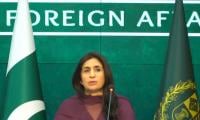By Mehtab Haider
ISLAMABAD: The coronavirus pandemic could cost the global economy $4.1 trillion (Rs682,650 billion) as it ravages the United States, Europe and other major economies, the Asian Development Bank (ADB) warned on Friday.
The Manila-based organisation said the "possibility of severe financial turmoil and financial crises cannot be discounted."
In its latest report, the ADB said the figure amounted to nearly 5% of worldwide economic output, based on the health emergency lasting 6 months or more. It added that the losses could be worse still.
"The estimated impact could be an underestimate, as additional channels such as ... possible social and financial crises, and long-term effects on health care and education are excluded from the analysis," the ADB's chief economist Yasuyuki Sawada said.
He added that a shorter containment period to stem the spread of the virus could reduce the economic losses to $2 trillion.
China growth sputters
The report said China, the world's second-biggest economy, saw double-digit contractions in business activity in January and February and will likely see growth fall to 2.3% this year from a three-decade low of 6.1% in 2019.
The ADB said China could suffer losses amounting to up to $692 billion if containment efforts drag on. But the bank estimated that growth would bounce back next year to more than 7%.
Asia as a whole is forecast to grow just 2.2% this year, its slowest pace since a 1.7% expansion during the 1998 Asian financial crisis.
Developing nations hit hard
The regional lender said growth in developing Asia would likely fall to 2.2% in 2020 from 5.2% last year, and account for up to 36% of the estimated losses. Sawada said the bank's forecasts assume the coronavirus outbreak will be contained this year and return to normal in 2021.
But he warned that "supply chains could be permanently interrupted, and there could be a retreat in globalisation and regional integration."
This would be a blow to Asia which has benefited hugely from open economies and liberal trade and capital flows in the past decade, he added.
Mehtab Haider adds: Amid massive slashing in Pakistan’s GDP growth prospects for two fiscal years, including the current 2019-20 and the next 2020-21 because of coronavirus, the World Bank is exploring possible options to provide $650 million to $01 billion more assistance that would enable Islamabad to combat COVID-19.
However, the World Bank (WB) has revised downward the GDP growth projections from 2.4 per cent to 1.1 per cent for the current fiscal year 2019-20. The GDP growth would also have negative impact next fiscal year as projection for the fiscal year 2020-21 has been slashed down from 3 per cent to 0.9 per cent. The WB has assessed that the negative impact of COVID-19 would remain on the country’s economy for the next six months, including three months of the current fiscal year and the first three months of the next fiscal year.
While talking to a selected group of reporters through video conference on Friday afternoon, the World Bank’s Country Director for Pakistan, Illango Patchamuthu, said, “We are looking at options to divert resources from existing envelop and efforts are also underway to allocate some more from additional resources. We are exploring options to provide US$650 million to US$01 billion but it will take some time for getting approval from the Bank’s forums.”
Replying to a question, Illango Patchamuthu said there was a portfolio of US$6.5 billion out of which major chunk remained undisbursed, so Pakistan had approached the Bank for diversion of these available resource envelop towards getting funding to fight COVID-19. He said the existing one and new funding in totality was under consideration that ranged from US$650 to US$01 billion. To another query on debt restructuring/waive-off from multilateral creditors, WB Country Head Illango said different proposals would be considered on the occasion of upcoming virtual annual meeting of IMF/World Bank and advised to refrain from plunging into any speculation till something concrete was summed up.
When asked about the precedent of Highly Indebted Poor Countries (HIPC) and any possibility to replicate it for providing debt relief to the countries hit by COVID-19, the WB official said it would depend upon certain criteria as tax-to-GDP ratio and other criterion would be considered but depends upon managing required funding to move ahead. Illango stated that they would be in a better position to inform journalists when things got approved from the authorities.
The World Bank’s Board of Directors, in its meeting held at Washington D.C. on Thursday, had approved US$200 million for Pakistan under the Pandemic Response Effectiveness Project (PREP) for which both sides here on Friday signed financing agreement.
The World Bank’s Program Leader for Equitable Growth, Shabih A. Mohib, on the occasion, said due to steep decline in economic activities since March 2020, the WB was revising the real GDP growth projection to 1.1 per cent from an earlier projection of 2.4 per cent. He added, “The drivers for this slowdown are the services and the manufacturing sectors that both contribute about 80 per cent to Pakistan’s GDP growth.”
Shabih A. Mohib further said the WB was expecting COVID-19 pandemic would abate over the next six months and a gradual recovery was expected over the rest of the year. “Therefore, we have revised our projections of GDP growth for FY21 to 0.9 per cent from the earlier 3 per cent,” he maintained.
To another query about its negative effects on fiscal side, the WB official said the slowdown of the economy would result into fall in revenue collection and would add up expenditure, so the bank also projected upward revision of 2 per cent of GDP into the budget deficit target for the current fiscal year.
When asked for initial official estimated losses of Rs 2.5 trillion calculated by the Planning Commission in collaboration with ministries/divisions, so how transparency would be ensured in the provision of monthly stipends to needy people, the WB’s official on Social Protection Amjad Ali said the government committed to provide US$525 million for providing Rs3,000 to daily wagers for four months period. He added the BISP data was old but now the government with the help of Nadra placed certain filters for exclusion of certain individuals, so that transparency could be ensured.
Saad was of the view that the battle of politics should be fought solely through political means
KP govt decided to develop gemstone business as a formal export sector and cluster at the Namak Mandi would be...
Khyber Pakhtunkhwa Minister for Higher Education, Archives, and Libraries, Meena Khan Afridi. — APP FilePESHAWAR:...
Vehicles and horse carts passing through flood water at Bara Bazar area on Khuwani bridge after heavy rain in Peshawar...
Amid the failure to revive the cash-bleeding PIA, government is left with no other option but to sell it to any...
Picture showing the Silver Jubilee Gate of the University of Karachi. — APP File KARACHI: The University of Karachi...







